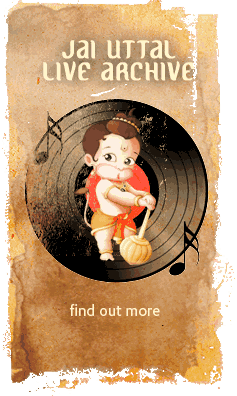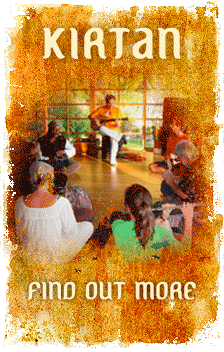The following article was featured in the June 2011 issue of Common Ground. You can browse the entire issue here.
Jai Uttal’s Unusual Journey
Despair, Dedication, Devotion
by Prajna Vieira
Jai Uttal is stirring a pot of chai in the kitchen of his San Anselmo apartment. Hariprasad Chaurasia plays softly in the background as he hands me a mug and we sit to talk. I secretly fret about the article I am here to interview him for—I really want to do him justice. He’s a Grammy-nominated world music icon whose work has inspired and uplifted so many, yet he struggled for years with drug addiction, anxiety, and deep insecurity. Today, Jai is at the top of his game, having released two critically acclaimed albums (Thunder Love and Bhakti Bazaar, both coproduced with longtime collaborator Ben Leinbach) in the last two years, with two more (one reggae kirtan and one kids kirtan) in the vault for summer release. He’s also my mentor.
For the past year and eight months, I’ve sat at Jai’s side as his backup singer, riding the waves of his spontaneous creativity and devotional longing. From tiny local yoga studios to huge festival stages in South America, with crowds ranging from several dozen to several thousand, I’ve enjoyed the best seat in the house. Jai was among the first few artists who pioneered the Western kirtan movement decades ago. Nowadays, it’s a worldwide phenomenon, with festivals popping up everywhere and a steady stream of emerging new artists. In person, Jai is ebullient, clever, and a great storyteller, but he’s also very private and sometimes shy. His level of musicianship is astonishing, flowing gracefully between classical Indian ragas and Appalachian hillbilly music, Brazilian samba, reggae, and blues. He sings with an intense emotional nakedness that is rare in the genre, where so many artists carefully craft a polite aura of dreamy bliss.
Awakening Music
Jai’s father was a record company exec who specialized in R&B, pop, and soul. Born Douglas Uttal, Jai grew up in New York City and started piano lessons at age 7, where something undoubtedly went wrong. “I don’t remember much of my childhood. There’s a big defense thing that blocks out a lot. Something about lessons with my music teacher … even to think about it I get a chill. I quit after a couple of years and didn’t want anything to do with music. I really reacted to it badly. I don’t know what it was, I don’t have any memory of it. Whenever I think back there I get this twisted feeling in my stomach.” A few years later Jai would take up the banjo with teachers he adored. Playing the banjo gave him a sense of peace, and he grew to love “old-timey music, pre-bluegrass,” translating hours of obscure fiddle music to the banjo. He was accepted into the High School of Music and Art, where he studied percussion. “I did well in academics, but the irony was that I did really poorly in music. I failed composition. Meanwhile, I was madly into the Beatles, madly into Jimi Hendrix. So banjo playing inched back and was replaced by electric guitar. I started listening to Ali Akbar Khan (known to many as “Khansahib”) and jamming along with my guitar… probably so horribly,” he laughs, cringing a little.
Jai enrolled at Reed College in Portland, where he attended a concert of Ali Akbar Khan. He was high on mescaline, and describes the performance as “totally, totally life-altering.” Three months later he moved to the Bay Area and began studying the sarod with Khansahib, who “insisted that everyone there study vocal music, even the tabla players,” Jai recalls. “It’s a necessity you know, he insists. So at first I was just doing it because he was telling me to. Before that, I wasn’t singing at all.” “Really?” I ask. I’m amazed that one of the most expressive vocalists I know of wasn’t singing from day one. “Did you even know that you had a good singing voice?” Jai cracks up. He has a great laugh. “I didn’t have a good singing voice!” “It was a total mystery to you?” “No, it wasn’t a mystery. I was very clear that I was not a singer, that I could not be a singer, and that I’d better not even think about being a singer! As you know, singing is probably the most close to the core, and I didn’t even want to get near that core. I hadn’t sung my whole life, and I’d been told not to sing, that my voice wasn’t good. I had a million reasons not to sing, but Khansahib made us. Then I remember one time practicing the raga in my room. I started singing, and I touched something in me that was so primordial and so … shalom. Do you know that shalom means ‘wholeness,’ not just ‘peace’? It was so whole, and that triggered a process which took many years to manifest. It was around 1970, before I went into India.”
Meeting The Master
Jai’s love of Indian spirituality, and in particular the path of bhakti (devotional) yoga, went hand in hand with his interest in Indian music. He traveled to India, where he met his guru, Neem Karoli Baba (affectionately called “Maharajji”)—the same guru of author Ram Dass and kirtan singers Krishna Das, Bhagavan Das, and others. Maharajji’s ashram was resounding with “constant kirtan,” according to Jai. “He told us Westerners to sing, and we sang like crazy! He was always getting us to sing, you know, as a group … a lot, a lot, a lot. At the same time, there was always the most beautiful Indian kirtan going on. Bengalis, mostly, but I remember when I first met Maharajji, it was Nepalis up there singing, and it was like music from heaven.”
Jai talks about Maharajji with real modesty, choosing his words carefully. “It’s hard to know what the master likes, but it seemed to make him happy when we were singing. Maybe that was just because it kept us out of trouble! But also, Maharajji’s devotion was emanating from his every molecule, so the practices of devotion are what happen in his temples. Bhakti and service. Devotion without service is self-indulgent bliss-out. Devotion with service is a way of life.” It’s astounding to think of the lives that have been profoundly altered by Maharajji’s blessing, but the faces in the audience of a Krishna Das or Jai Uttal concert speak volumes about its ripple effect. For so many, kirtan is not just an enjoyable musical expression—it’s life-saving, and Jai counts himself among those who take refuge in it. “I started leading kirtans before I was any good at it, and I was petrified, but I needed to do it. I’m sure that Maharajji forced me to do it for my own salvation, sanity, and survival.” He looks down, silent for a moment, then continues. “For a long, long time I didn’t talk about Maharajji in public. It’s not like I would lie about it, but I wouldn’t talk about it unless I was directly asked about him. The relationship is so intimate. You start talking and before you know it, it becomes a part of your shtick. I don’t really have a shtick, so to speak. I didn’t want that to be part of my repertoire.”
The Dark Times
Returning from India, Jai dove into his music full of inspiration from his time with Maharajji and with the Bauls of Bengal—wandering musician-mystics whose poetry and songs of intense, passionate longing for the Divine had struck a chord within him. He began leading kirtans and continued to study Indian music. In 1991 he released his acclaimed debut album, Footprints, a heartfelt meeting of his Indian and Western musical influences. Jai and his band, The Pagan Love Orchestra, quickly gained international acclaim for their vibrant, innovative world music, and they released a series of successful albums over the years. Outwardly, Jai was immersed in his work, but his inner life was giving way to an increasing sorrow that would lead him into the darkest places of his life. Jai laughs gently and looks at his hands, remembering the double life he once lived. “Well, drug addiction and everything that goes with that. You know, fill in the blanks. I guess you could say it was a successful manifestation of a life that supported the belief that I was worthless, useless, and cursed!” He laughs again, and sits up a little taller. “But not successful enough, because the support of my guru and God’s name saved me and was always there. I was still singing and doing music, and the music was my connection to spirit. I don’t feel that I was hypocritical in that, but I will say that there was a lot of shakiness in the integrity of my walk.”
The music Jai put out during those years is revealing. “I see it as being very dark,” he says. “I still experience music as a catharsis. If not, why do it? The angst level is different now. My life is such evidence of God’s mercy.” Jai’s heartache and longing came through more fully on his third album, Beggars and Saints (1994). “I thought it was the saddest. It was dripping with pain! I thought, ‘How is anybody going to get through this? What am I giving to the world? Sixty minutes of anguish!’ But even still, people tell me how much joy, nourishment, and healing that record gave them. So that was discovering that music is part of my own healing journey, and then gradually I began to let in the fact that it is also healing to others.” Jai knows that his music and story have been healing for me personally. My own struggle with alcoholism kept me from singing kirtan for a long time, and I was just over a year sober when we met. I think a lot of people can relate to his wholehearted pursuit of self-destruction and simultaneous yearning to touch the Divine. Whenever we talk of these things, he becomes full of warmth and compassion. Some people have to go through hell to discover that the One they were yearning for was there all along. “And maybe I could just credit that spiritual longing to Maharajji,” Jai adds thoughtfully. “It didn’t seem to be touched by anything in the external world. Drugs and alcohol didn’t dull it; they dulled a lot of other stuff. The spiritual longing and the realization from early on that the music was my salvation—that just overrode everything. It’s a many-lifetimes job, having all the elements of our life being in harmony with each other. Obviously, one can’t be madly committed to spiritual redemption and at the same time let the rest of one’s life be in shambles. It doesn’t work. It’s not honoring God, and it’s not honoring yourself. It’s not honoring the people around you. It’s not honoring life.”
Love and Redemption
Jai’s inner turmoil began to soften when he met his wife, Nubia Teixeira, a yoga teacher and bhakti dancer from Brazil. “I was deeply embedded in the belief that even wanting happiness in life was unspiritual. You can see the incredible conditioning that goes into that thinking—that our humanness is to be run away from at all costs, rather than embracing our entire manifestation as God’s grace, the easy parts and the hard parts. My life was really… complicatedly messed up, and when I met Nubia, for the first time I wanted to feel. And that messed up everything, because of course, you can’t be a drug addict if you want to feel! I’m not saying that I got sober for Nubia, ’cause that’s not true. But it was the first time I wanted to be sober in 35 years. She was the first person I ever had a relationship with where I felt safe enough to be honest. Suddenly I realized that I was lying all the time, to myself primarily. Nubia allowed me to start that process. And we had a baby! For me, having a baby like Ezra Gopal opened up my relationship to Maharajji and to God in a way that nothing else ever had.
Kirtan, Success, and Ego
Many people are eager to connect personally with Jai and share their experiences. Some ask what he’s “doing to the energy” during the kirtans. Without a hint of condescension, Jai deflects any assumptions. “We all think we’re the doer, and we gotta sing ourselves into bliss, and while we’re at it, let’s sing the other people into bliss. There are many paths of spirituality in India, and there are paths that use mantra and singing to create effects, to generate energy in chakras. But that has no appeal to me. I don’t do anything like that. I’m trying to stay grounded and find a place of surrender, and within that place of surrender trying to find a place in my heart that is awake, that is just heart. There was a while that I really felt, leading kirtan, that I was responsible for everybody’s experience. And oh, what a completely illusory, backbreaking, shoulder-squashing, spirit-crushing burden that is! I, of course, fall back into it sometimes, but not as deeply, and I understand now that it’s not my job.” The vast majority of what Jai sings live is composed on the fly—either during sound check or in front of the audience, in real time. I can’t think of any other musician who lets the audience so close to their creative process. “It’s certainly part of the training I had on and off for 40 years with Ali Akbar Khan. Everything he taught us was, ‘Be on the edge. Improvise, but let it come from a base of continuing practice.’ Sometimes I think I’m a little nuts, that I’m always improvising. But I’m praying, and I’m using the improvisation as a way of exploring my heart. Some people have huge audiences, and some people, like me, have modest audiences. Perhaps if I did it differently, I would have bigger audiences. But I can’t do it differently, and I don’t want to. It’s so joyful! What do you have to offer people but the honesty, depth, and realness of your own prayer? Otherwise, what are you offering? An entertainment—which is not bad, but if you say you want to offer the highest, then this is what I can respond to. If you say, ‘I want to make a lot of money, I want bigger audiences, I want people to love me, I want to be on the cover of Yoga Journal,’ well then, you can explore other strategies, you know? I’m not saying I never have those thoughts, but those are the thoughts that I do my best to offer up because they’re dead ends—they’re passageways to hell. I want to really know what devotion is. And faith, and service. Just those three things. Could it ever happen in this life that I will really know what devotion is?” It sounds absurd coming from a man whose life is literally sustained and supported by devotion. “If anyone’s giving it a really good try, it’d be you,” I point out, and Jai laughs. He says, “I am giving it a try, but you know, so are you, and so are many! You know the Bauls of Bengal? ‘Light has burst in the walls of the sky’—that’s one of their lines. Always bursting that canopy above us, breaking through.”
Prajna Vieira loves singing kirtan, whether accompanying Jai Uttal, or with Ben Leinbach, or as part of Mukti, her own ensemble. She lives in San Jose, where she teaches lots of yoga classes. PrajnaVieira.com







